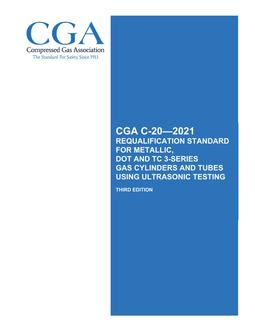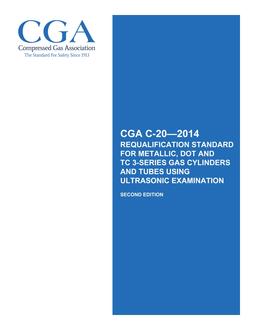CGA C-20
Click here to purchase
This standard identifies and describes the various acceptable UE methods (also known as ultrasonic testing [UT] methods) that may be used in place of internal visual inspection and hydrostatic requalification methods used to examine certain metallic, U.S. DOT/Transport Canada 3-series gas cylinders and tubes as mandated by 49 CFR and TC’s Transportation of Dangerous Goods Regulations, and cylinders manufactured under certain DOT special permits or TC equivalency certificates. This standard also specifies the allowable flaw acceptance/rejection criteria to be used. This standard may also be applied to other seamless steel and aluminum alloy cylinders and tubes when authorized by the regulatory authority.
Aluminum alloy cylinders susceptible to sustained load cracking such as those manufactured from 6351 aluminum alloy shall also have the shoulder and neck area internally visually inspected and an eddy current examination of neck threads completed in accordance with established regulatory requirements.
This standard does not address any safety, health, or environmental considerations associated with UE or regulations and codes. Operating procedures and processes regarding worker safety precautions and requirements shall be met.
Product Details
- Edition:
- 3rd
- Published:
- 01/01/2021
- Number of Pages:
- 50
- File Size:
- 1 file , 1.9 MB
CGA C-20
Click here to purchase
This standard identifies and describes the various acceptable UE methods (also known as ultrasonic testing [UT] methods) that may be used in place of internal visual inspection and hydrostatic requalification methods used to examine certain metallic, U.S. DOT/Transport Canada 3-series gas cylinders and tubes as mandated by 49 CFR and TC’s Transportation of Dangerous Goods Regulations, and cylinders manufactured under certain DOT special permits or TC equivalency certificates. This standard also specifies the allowable flaw acceptance/rejection criteria to be used. This standard may also be applied to other seamless steel and aluminum alloy cylinders and tubes when authorized by the regulatory authority.
Aluminum alloy cylinders susceptible to sustained load cracking such as those manufactured from 6351 aluminum alloy shall also have the shoulder and neck area internally visually inspected and an eddy current examination of neck threads completed in accordance with established regulatory requirements.
This standard does not address any safety, health, or environmental considerations associated with UE or regulations and codes. Operating procedures and processes regarding worker safety precautions and requirements shall be met.
Product Details
- Edition:
- 2nd
- Published:
- 08/01/2014
- Number of Pages:
- 42
- File Size:
- 1 file , 2.4 MB

